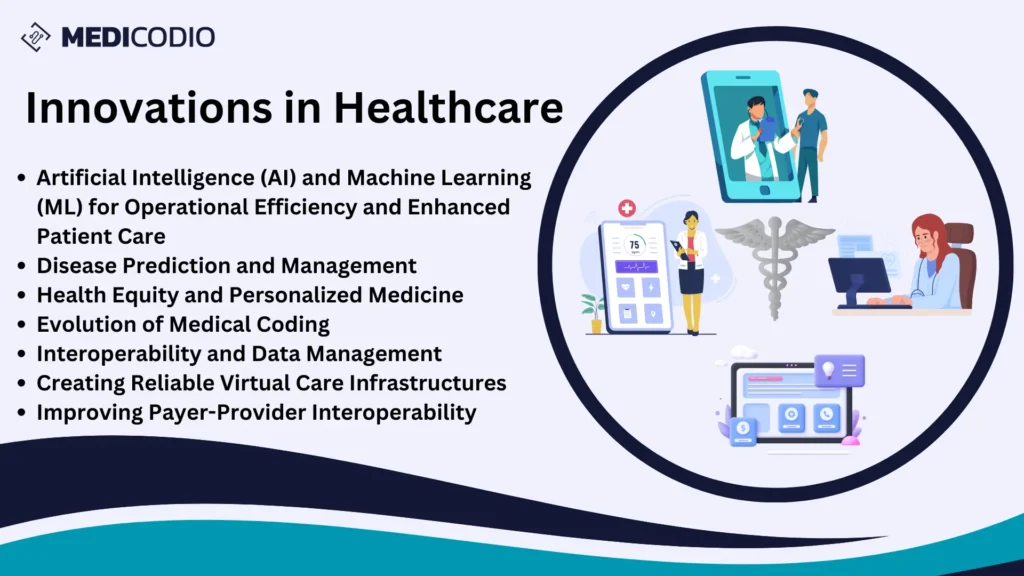In the wake of explosive advancements in generative AI tools in 2023, the healthcare industry is poised for a transformative year in 2024. Healthcare leaders are gearing up to harness these innovations to redefine the industry’s future, with a focus on improving revenue cycles, operational efficiency, and patient care. Over the past few years, there have been several innovations in healthcare. Here are the key trends that will shape healthcare in 2024.
1. Artificial Intelligence (AI) and Machine Learning (ML) for Operational Efficiency and Enhanced Patient Care
-
- Enhancements in Revenue Cycle: In 2024, healthcare organizations are set to actively engage AI within the mid-revenue cycle. Enhancing healthcare revenue requires clear payment expectations, accurate procedure coding, account follow-up, payment posting, and more. This strategic move aims to preserve margin, reduce operational costs, and address workforce gaps. With increasing rates of payer denials, providers are catching up to payers and health plans using AI, ML, and other intelligent tools.
-
- Streamlining Revenue Cycle Management: AI, ML, and automated decision engines will play a significant role in streamlining revenue cycle management processes. This includes reducing denials and eliminating manual work processes in real-time. Health systems are expected to invest in upskilling and reskilling their financial teams to fully realize the value of these technology investments.
2. Disease Prediction and Management
The adoption of AI-powered predictive models and remote monitoring systems is expected to rise in 2024. These tools will detect early warning signs of diseases, lessening the financial burden of an aging population and chronic conditions. The innovations in healthcare will witness further research into the use of generative AI to integrate years of medical knowledge into a single tool. Providers will continue responding to staff shortages through technology, especially in cardiology, radiology, and neurology.
3. Health Equity and Personalized Medicine
AI is set to enhance healthcare accessibility in 2024, narrowing the divide between urban hubs and underserved communities. The integration of telemedicine and AI-driven virtual assistants will ensure high-quality care for everyone. Personalized treatment plans and AI-powered virtual assistants will transform the patient experience, focusing on proactive health management.
4. Evolution of Medical Coding
A fundamental shift in how healthcare providers approach medical coding is predicted for 2024. As intelligent technologies evolve rapidly, medical coding is expected to expand beyond revenue cycle management. AI medical coding software will become a key tool to optimize RCM processes and fuel medical coding productivity. Medical coding helps healthcare professionals better understand trends, allocate resources efficiently, and make informed decisions to improve patient care while optimizing budget utilization. Medical information is standardized through this process to make it more easily accessible and understandable to everyone.

5. Interoperability and Data Management
While AI capabilities surge healthcare into the future, interoperability challenges remain a bottleneck. Improving interoperability is crucial, especially as healthcare at home gains significance. Healthcare leaders emphasize the need to overcome these challenges to ensure seamless data exchange and accessibility.
6. Creating Reliable Virtual Care Infrastructures
Another interesting innovation in healthcare is virtual care. Unlocking the full potential of virtual care in 2024 requires a focus on interoperability. Health systems integrating virtual care must ensure both quality and affordability. Evaluating data management processes becomes imperative to prevent redundancy and inefficiencies, enabling affordable and effective virtual care delivery.
7. Improving Payer-Provider Interoperability
In 2024, payers and providers are expected to embrace new processes, procedures, and technology to transform information and patient data exchange. This evolution aims to reduce administrative burdens, fostering greater collaboration and productivity. Overcoming longstanding challenges in payer-provider interoperability will lead to more efficient and timely access to information, building trust in the payer-provider relationship.
As we navigate through the trends shaping 2024, healthcare is on the brink of a groundbreaking transformation. The integration of AI and machine learning is set to redefine the industry, making it more efficient, accessible, and patient-centric. The emphasis on health equity, personalized medicine, and interoperability will be pivotal in creating a healthcare landscape that meets the evolving needs of patients and providers alike.
The year 2024 promises to be a pivotal one for the healthcare industry, marked by a surge in innovations in healthcare powered by artificial intelligence (AI) and other emerging technologies. These advancements hold immense potential to improve operational efficiency, personalize patient care, and address long-standing challenges like workforce shortages and healthcare disparities. While data management and interoperability remain hurdles to overcome, healthcare leaders who embrace these innovations are poised to revolutionize the industry and create a more equitable and accessible healthcare system for all. As the year unfolds, it will be exciting to witness the ways in which these innovations translate to real-world improvements in patient outcomes and overall healthcare delivery.





